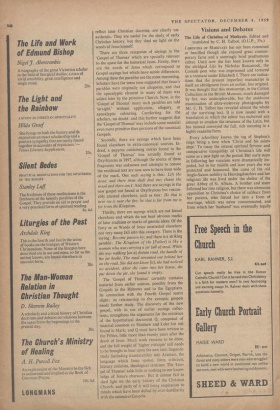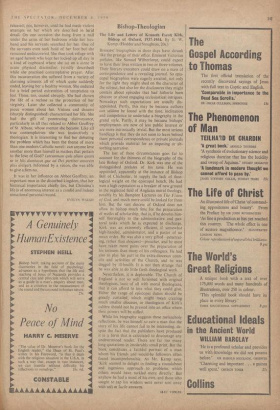Visions and Debates
CHRISTINA OF M ARKYATE has not been canonised or beatified though she enjoyed great contem- porary fame and a seemingly brief posthumous cultus. Until now she has been known only in the abridged Life by Nicholas Roscanock, the Cornish poet who was imprisoned and tortured as a recusant under Elizabeth L There are indica- tions that the present imperfect manuscript is itself an abridgment from an earlier, lost original. It was thought that this manuscript, in the Cotton Collection in the British Museum, much damaged by tire, was undecipherable, but the assiduous examination of ultra-violet-ray photographs by Mr. C. H. Talbot has revealed almost the whole of the surviving text. It is now issued with a translation in which the editor has eschewed any attempt to emulate the terseness of the Latin, but has instead conveyed the full, rich meaning in a highly readable form.
Every schoolboy knows the tag of Stephen's reign being a time when 'Christ and his saints slept.' To many the intense spiritual fervour and comparative tranquillity of Christina's life will come as a new light on the period. Her early steps in following her vocation were dramatically im- peded, but in her middle and later years she was protected and honoured. She came of the old Anglo-Saxon nobility in Huntingdonshire and her religious life was lived under the shelter of the great Abbey of St. Albans. A brother and sister followed her into religion, but there was strenuous opposition to Christina's choice of celibacy from her parents, who forced her into a form of marriage, which was never consummated, and from which her 'husband' was eventually legally
released; not, however, until he had made violent attempts on her which are described in lurid detail. On one occasion she hung from a nail under the arras of her bedroom while her hus- band and his servants searched for her. One of the servants even took hold of her foot but she remained undiscovered. She then took refuge with an aged hermit who kept her locked up all day in a kind of cupboard where she sat on a stone in acute physical discomfort (vividly described) while she practised contemplative prayer. After this incarceration she suffered from a variety of alarming ailments all of which quite suddenly ended, leaving her a healthy woman. She endured for a brief period extremities of temptation to lust. These, too, ceased abruptly. She had chosen the life of a recluse as the protection of her virginity. Later she collected a community of pious women about her. Visions and dreams (sharply distinguished) characterised her life. She had the gift of penetrating clairvoyance, particularly in all that related to Abbot Geoffrey of St. Albans, whose mentor she became. Like all true contemplatives she was instinctively a theologian. It is interesting to find her debating the problem which has been the theme of more than one modern Catholic novel: can anyone love another more than himself in matters that pertain to the love of God? (tartanain gins alium quail se in hiis dunitaxat (pre ad Dei pertinet antoreni plus deligat). Informed by a vision, she was able to give a firm no.
It was in her influence on Abbot Geoffrey, an important man in the disturbed kingdom, that her historical importance chiefly lies, but Christina's life is of enormous interest as a candid and indeed sensational personal record.
EVELYN WAUGH















































 Previous page
Previous page